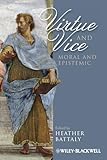Virtue and vice, moral and epistemic
Material type: TextSeries: Metaphilosophy series in philosophyPublication details: Chichester Wiley-Blackwell 2010Description: ix,245pISBN:
TextSeries: Metaphilosophy series in philosophyPublication details: Chichester Wiley-Blackwell 2010Description: ix,245pISBN: - 9781444335620
- 179.9 22 VI-
- BJ1521 .V564 2010
 Print
Print
| Item type | Home library | Collection | Call number | Status | Date due | Barcode | |
|---|---|---|---|---|---|---|---|
 Print
Print
|
OPJGU Sonepat- Campus Main Library | General Books | 179.9 VI- (Browse shelf(Opens below)) | Available | 117406 |
Browsing OPJGU Sonepat- Campus shelves, Collection: General Books Close shelf browser (Hides shelf browser)
Includes bibliographical references and index.
Includes bibliographical references and index.
Machine generated contents note: Notes on Contributors -- Introduction: Virtue and Vice: Heather Battaly -- 1. Virtue Ethics and Virtue Epistemology: Roger Crisp -- 2. Exemplarist Virtue Theory: Linda Zagzebski -- 3. Right Act, Virtuous Motive: Thomas Hurka -- 4. Agency Ascriptions in Ethics and Epistemology: Or, Navigating Intersections, Narrow and Broad: Guy Axtell -- 5. Virtues, Social Roles, and Contextualism: Sarah Wright -- 6. Virtue, Emotion, and Attention: Michael S. Brady -- 7. Feeling Without Thinking: Lessons from the Ancients on Emotion and Virtue-Acquisition: Amy Coplan -- 8. A Challenge to Intellectual Virtue from Moral Virtue: The Case of Universal Love: Christine Swanton -- 9. Open-Mindedness: Wayne Riggs -- 10. Epistemic Malevolence: Jason Baehr -- 11. Epistemic Self-Indulgence: Heather Battaly -- Index.
"Virtues and vices matter in both ethics and epistemology - it matters whether an agent has moral and intellectual virtues or moral and intellectual vices. In fact, this is the veritable rallying cry of both virtue ethics and virtue epistemology. But do analogies between virtues and vices across these two philosophical fields even succeed? If so, how much do virtues and vices really matter? Are they - or are exemplars - at the foundation of moral and epistemic theory? And if virtues and vices do matter, what exactly are they? Virtue and Vice, Moral and Epistemic presents a series of thought provoking essays that delve deeply into the role of virtue and vice that cut across the fields of ethics and epistemology. Featuring the voices of both virtue ethicists and epistemologists, readings offer competing accounts of the foundation of moral theory while exploring the connections between virtue and emotion, and virtue and contextualism. Other essays analyze universal love, open-mindedness, epistemic malevolence, and epistemic self-indulgence. Written by leading or upcoming figures in ethics and epistemology this book offers provocative insights into the most cutting edge thinking concerning the application of the intellect into virtue theory - an important development in the contemporary analytic tradition"--
There are no comments on this title.







